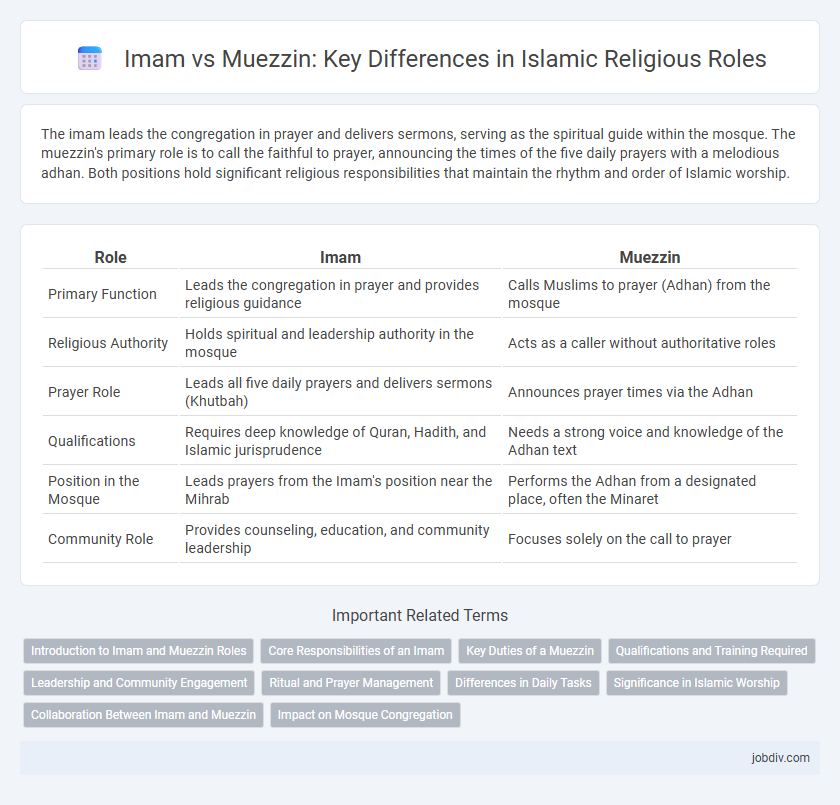The imam leads the congregation in prayer and delivers sermons, serving as the spiritual guide within the mosque. The muezzin's primary role is to call the faithful to prayer, announcing the times of the five daily prayers with a melodious adhan. Both positions hold significant religious responsibilities that maintain the rhythm and order of Islamic worship.
Table of Comparison
| Role | Imam | Muezzin |
|---|---|---|
| Primary Function | Leads the congregation in prayer and provides religious guidance | Calls Muslims to prayer (Adhan) from the mosque |
| Religious Authority | Holds spiritual and leadership authority in the mosque | Acts as a caller without authoritative roles |
| Prayer Role | Leads all five daily prayers and delivers sermons (Khutbah) | Announces prayer times via the Adhan |
| Qualifications | Requires deep knowledge of Quran, Hadith, and Islamic jurisprudence | Needs a strong voice and knowledge of the Adhan text |
| Position in the Mosque | Leads prayers from the Imam's position near the Mihrab | Performs the Adhan from a designated place, often the Minaret |
| Community Role | Provides counseling, education, and community leadership | Focuses solely on the call to prayer |
Introduction to Imam and Muezzin Roles
Imams serve as spiritual leaders within Islamic communities, guiding prayers, delivering sermons, and providing religious education based on the Quran and Hadith. Muezzins hold the crucial role of calling the faithful to prayer five times a day through the Adhan, ensuring timely worship is observed. Both roles are integral to Islamic practice, fostering community cohesion and religious observance.
Core Responsibilities of an Imam
An Imam leads the congregation in prayers, delivers sermons (khutbah), and provides spiritual guidance, ensuring adherence to Islamic teachings and community welfare. They interpret religious texts, resolve disputes, and offer counseling, fostering the moral and social development of the Muslim community. The Muezzin, by contrast, primarily calls the faithful to prayer, highlighting their distinct but complementary roles.
Key Duties of a Muezzin
The key duties of a Muezzin include performing the Adhan, the Islamic call to prayer, from the mosque's minaret or a designated place to notify worshippers of prayer times. The Muezzin must have a clear and melodious voice to recite the Adhan eloquently, ensuring the message to gather for Salah is conveyed effectively. Unlike the Imam, who leads the prayer and provides religious guidance, the Muezzin's primary responsibility centers on calling the faithful to worship punctually throughout the day.
Qualifications and Training Required
An Imam requires extensive Islamic education, including mastery of Quranic exegesis, Hadith, Fiqh (Islamic jurisprudence), and leadership skills, often attained through years of formal study at religious institutions or under qualified scholars. The Muezzin must have a strong, melodious voice and a thorough knowledge of the call to prayer (Adhan), typically trained through practical experience and vocal coaching rather than formal theological education. While the Imam leads prayers and provides religious guidance, the Muezzin's primary qualification centers on the accurate, respectful, and precise recitation of the Adhan.
Leadership and Community Engagement
Imams serve as spiritual leaders, offering guidance in religious teachings, leading prayers, and providing community counsel, which fosters a strong sense of unity and faith. Muezzins play a crucial role by calling the faithful to prayer through the Adhan, reinforcing the rhythm of daily worship and community participation. Both roles complement each other, with the Imam shaping religious leadership and the Muezzin sustaining community engagement through the sacred call.
Ritual and Prayer Management
Imams lead congregational prayers and deliver sermons, guiding worshippers through the ritual with precise recitation and spiritual instruction. Muezzins are responsible for calling the Adhan, signaling prayer times and gathering the community for worship. The Imam manages the prayer's flow and ritual correctness while the Muezzin ensures timely awareness and participation through the vocal announcement.
Differences in Daily Tasks
Imams lead daily prayers, deliver sermons (khutbah), and provide spiritual guidance within the mosque, often interpreting Islamic law. Muezzins are responsible for calling the adhan (call to prayer) five times a day from the mosque's minaret, ensuring the community is reminded of prayer times. While the Imam holds a more scholarly and leadership role, the Muezzin's task is primarily vocal and focused on timing and ritual proclamation.
Significance in Islamic Worship
Imam serves as the spiritual leader guiding the congregation during Islamic prayers, delivering sermons, and interpreting religious texts, which is crucial for maintaining community faith and practice. Muezzin is responsible for calling the Adhan, the call to prayer, marking the designated prayer times and uniting Muslims for worship across different locations. Both roles hold significant importance in Islamic worship by facilitating organized prayer and fostering communal religious observance.
Collaboration Between Imam and Muezzin
The collaboration between the Imam and Muezzin is crucial for the seamless conduct of daily prayers in a mosque, where the Imam leads the prayer and the Muezzin calls the Adhan, signaling worshippers to gather. Both roles require a deep understanding of Islamic teachings, with the Imam providing spiritual guidance and the Muezzin enhancing community cohesion through timely and melodious calls to prayer. Their coordinated efforts ensure a harmonious worship environment, reflecting the unity and discipline emphasized in Islamic practices.
Impact on Mosque Congregation
The Imam shapes the spiritual experience of the mosque congregation through leading prayers, delivering sermons, and offering religious guidance, fostering a sense of unity and deeper understanding of Islamic teachings. The Muezzin plays a crucial role by calling the faithful to prayer, ensuring timely attendance and maintaining the rhythm of daily worship within the mosque community. Both roles significantly impact the mosque congregation by reinforcing discipline, spirituality, and communal participation.
Imam vs Muezzin Infographic

 jobdiv.com
jobdiv.com